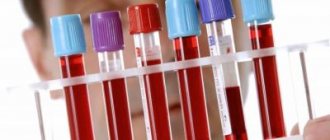Blood group, like the Rh factor, are permanent indicators of the human body. And their basis is genetically laid from the moment of the beginning of intrauterine life. However, there are often reports that under various circumstances a person’s blood type changes . Why is this possible and is it dangerous for our health? Or is this process completely normal? Let's find out...
You can read about what blood groups exist in nature and what the Rh factor is in this article.
Changes in blood type over the course of life
Situations where the blood type changes spontaneously and seemingly for no apparent reason are practically unknown to medicine. The bone marrow of a healthy person is programmed by DNA code to produce the same type of blood cells for life. At the same time, special protein antigens are located on each red blood cell, which make it possible to determine Rhesus status and classify blood into group 1, 2, 3 or 4.
Doctors unanimously say that in a healthy person it is impossible to change the blood type and Rh factor over the course of life.
When such cases appear, there is nothing left to do but attribute the result to diagnostic errors . If a change in blood group was detected during repeated laboratory tests, then one should look for good reasons for this.
Why does the Rh factor change?
The proteins responsible for determining the Rh factor “live” on the membrane of red blood cells. That is why, in the case of a strong increase in the number of red cells in the plasma, the analysis may show not only the wrong group, but also the wrong Rh factor, which actually exists. In addition, the results of laboratory tests may be distorted if there are proteins in the body that, in certain circumstances, demonstrate the same characteristics as the substances responsible for “positive” Rh.
In addition, in the history of modern medicine, there is one case of a change in the Rh factor, which has not yet found a scientific explanation. Nine-year-old girl Demi Lee Brennan underwent a liver transplant, after which her blood turned from the first “negative” to the first “positive”. But world medicine knows no more such cases [4].
Best materials of the month
- Coronaviruses: SARS-CoV-2 (COVID-19)
- Antibiotics for the prevention and treatment of COVID-19: how effective are they?
- The most common "office" diseases
- Does vodka kill coronavirus?
- How to stay alive on our roads?
Changes in blood type during pregnancy
Most often, reports of changes in blood grouping come from pregnant women who are registered at the antenatal clinic and periodically donate blood for analysis. Indeed, blood type can change during pregnancy . However, it is very important to note that this is a false shift .
It is due to the fact that the expectant mother’s body increases the production of red blood cells. At the same time, due to accelerated hematopoiesis, it is possible to form blood cells that have a small amount of group antigens on their surface or are completely absent. At this point, a blood group test may show a false result.
This is extremely important. After all, if a pregnant woman needs a blood transfusion, it must be carried out according to the “old” blood group (which was determined before pregnancy). Otherwise, a hemagglutination reaction may occur, i.e. red blood cells stick together and precipitate. This situation is life-threatening for both the mother and the fetus.
"Pros" and "cons" of our blood
The Rh factor is a qualitative assessment of a blood characteristic parameter, depending on the presence or absence of D antigen in the human body. This indicator is innate (!).
The presence of D-antigen protein molecules is a sign of positive Rhesus (Rh+). Their absence is negative (RH-).
The second case is less common. Its owners are only about 15% of the world's population. The remaining 85% of the population has a plus sign.
There is no intermediate option. There are only two of them: either “positive” or “negative”.
Changing blood group in pathological conditions
Potentially, the blood type and Rh factor can also change in various genetic and infectious diseases that lead to hematopoietic disorders and direct damage to red blood cells:
- Blood diseases (thalassemia);
- Bone marrow tumors (leukemia, hemoblastosis, hematosarcoma);
- Viral infections (HIV and AIDS, viral hepatitis);
- Bacterial infections (plague, yellow fever, typhus);
- Parasitic infections (malaria);
- Poisoning with chemicals (nitrates, nitrites, aniline dyes, acids, ethers, gasoline, ethyl alcohol).
The red blood cells of each person have individual sensitivity to the listed damaging factors. Therefore, in such diseases, changing the blood group or Rh factor is possible, but not mandatory . However, such changes are temporary. After recovery, the hematopoietic system should produce full-fledged blood cells that a person had before his illness.
What else could cause change?
Blood type can only be determined through laboratory analysis. To do this, the sample is mixed with sera containing different types of antibodies and it is observed in which cases the red blood cells stick together. But sometimes during such analysis you can get the wrong result. One of the reasons, although not the only one, is the laboratory assistant’s mistake. But there are cases when the analysis was carried out correctly, but still shows completely different data than was previously obtained. In such cases, they do not speak of a change of group, but of a distortion of the results of the analysis. And this can happen for a number of objective reasons.
Infection
Against the background of some infectious diseases, the body produces specific enzymes that, entering the blood, cause the splitting off of part of antigen A, due to which it acquires the characteristics of antigen B. This process does not affect the composition of the plasma in any way, but if an analysis is done at this time, it is the likelihood of getting a distorted result. If the study is repeated after recovery, the reaction will indicate the correct group [1].
Diseases affecting blood composition
Some diseases are accompanied by increased production of red blood cells. In the presence of too many red blood cells, the antibodies reach a concentration insufficient for the chemical reaction that defines the group. As a result, the studies also show the wrong result.
A change also occurs in patients with myeloid leukemia, an oncological disease, during which the number of degenerated white blood cells in the plasma rapidly increases, and the concentration of antigens decreases [2].
Effect of bacteria
Bacteria can also affect your blood type. While studying the intestinal microbiota, scientists discovered a bacterium that is capable of changing groups A and B to 0, cutting off the corresponding antigens [3]. But such changes are also temporary - they persist as long as the bacterium is present in the body, then the group becomes the same as before.
Pregnancy
It is during pregnancy that many women discover that they have a “change in blood type.” The reason is also the number of red blood cells. During pregnancy, red cells are produced by the bone marrow more intensively than during other periods of life. As a result, the concentration of antibodies also changes, causing distortion of test results.
Irreversible change in blood type
This becomes possible with a complete bone marrow transplant. Patients diagnosed with malignant bone marrow tumors need to have it replaced. As a result of this treatment procedure, a person receives a donor organ that produces new blood cells.
It should be noted that bone marrow donors are selected very carefully. The transplanted bone marrow must match the recipient's bone marrow as closely as possible. Therefore, doctors most often choose donors with the same blood type and Rh factor as the recipient.
Rh factor in a pregnant woman. Plus or minus?
There are those things that we can influence and those that we cannot influence. We cannot influence our Rh factor and the Rh factor of our child, but we are obliged to prevent complications during pregnancy and after childbirth associated with Rh conflict.
Let's start in order, the Rh factor is a genetically inherited trait, it is inherited from parents. It can be positive and negative. This is an indicator of the presence of certain antigens in the blood. Initially, it is determined in order to correctly select donors when transfusing blood from person to person, in order to avoid serious complications. If you remember the school biology course with problems about peas, then this is the same case: when Rh-positive parents can still give birth to an Rh-negative child in 25 percent of cases, and there is no catch in this, this is called an autosomal recessive type of inheritance, and the parents are heterozygotes, that is, carriers for this trait. Let’s not delve into genetics; it is important to understand that from the moment of conception, both for us and for our children, much is predetermined: from the gender of the child, the color of his eyes and temperament to the Rh factor. Whether the Rh factor is positive or negative, we can only state after the fact. Why such close attention to the Rh factor of a pregnant woman? And is it necessary to get preventive vaccinations to prevent Rh-conflict during pregnancy?.. You can often hear: “My friend says that she will carry it during her first pregnancy, you don’t have to get it.” And then, when he was not expected at all, His Majesty arises - the Rhesus conflict.
What is the reason?
If the Rh factor of a pregnant woman is positive, then no matter what the Rh factor of the fetus is, there will be no conflict. If a woman is Rh negative and the father is Rh positive, then the fetus can inherit both positive and negative Rh factors. An Rh-positive fetus may be subject to immune attack from an Rh-negative mother, and this will affect its health in utero and after birth. This is called Rhesus conflict.
What to do? In the 21st century, there is a clear prevention algorithm.
- When registering, both spouses' blood type and Rh factor are determined.
- If the spouse has a negative Rh factor and the spouse has a positive Rh factor, a determination of special antibodies is prescribed once a month.
- In the absence of such antibodies in the mother, at 28 weeks of pregnancy and after childbirth, the woman is offered a safe vaccination that will prevent the occurrence of conflict both during this and subsequent pregnancies. Therefore, it is extremely important to carry out such a preventive measure during the first pregnancy. Also, if there is a threat of miscarriage or spotting in early stages of pregnancy, it is also important to get such a vaccination in order to avoid Rh complications when mixing the blood of mother and fetus (this should not happen during pregnancy, but is possible in some obstetric situations).
If antibodies are detected in a pregnant Rh-negative woman, there is no reason to panic; it is important to monitor the titer of such antibodies.
If an immune attack occurs from a woman to a fetus, it occurs only after 22 weeks of pregnancy (even if antibodies, for example, are detected at 10 weeks). Therefore, after 22 weeks, such a pregnant woman needs to evaluate blood flow indicators and the condition of the fetus based on the results of ultrasound diagnostics. Careful observation by a competent obstetrician-gynecologist is necessary. 50 years ago, the first vaccination was given to a pregnant woman for intrauterine prevention of Rh conflict in the fetus. For 50 years, people have been able to prevent many complications associated with this problem. We cannot influence the Rh factor of the fetus, but we can avoid complications of Rh conflict.
And for dessert: Remember the poem by Sergei Mikhalkov: “From a carriage to a rocket. What progress has come.” Currently, new opportunities have emerged for determining the Rh factor in the fetus, starting from 9 weeks of pregnancy - non-invasive determination of the Rh factor in the fetus. Using maternal venous blood (usual blood sampling from a vein in the mother), it is possible to determine from the fetal DNA of the fetus already after 9 weeks of pregnancy which Rh factor the fetus has inherited. And this, of course, helps in determining further pregnancy management tactics. It is important to discuss such information, rich in terms and genetic concepts, with your obstetrician-gynecologist. Without unnecessary panic, advice from friends and Internet forums. Actions during pregnancy must be verified and justified. Also, information from the doctor should be understandable and accessible to the expectant mother.
Obstetrician-gynecologists at the FAMILY CLINIC have extensive experience in caring for pregnant women, including those with Rh-conflict pregnancies. And we have already congratulated our patients many times with great joy on the birth of long-awaited and healthy babies.
Idiopathic change of blood group and Rh factor
“All my life there was one group, and now suddenly it has changed for some reason” - is this possible?
In medicine, all diseases and pathological conditions, the cause of which is not fully studied and understood, are usually called “idiopathic”. Changing your blood type is no exception. Therefore, all cases when no one can name the reason for the change that occurred can be classified as an idiopathic change in blood group.
A change in blood type occurs without any clinical manifestations. Calm and quiet. Therefore, we can assume that such changes do not harm human health.
How is the Rh factor transmitted?
This indicator is given to a person from birth. The acquisition scheme is simple:
- A positive father and mother give a 75% chance of a positive Rh in the child and a 25% chance of a negative one.
- Negative parents mean 100% probability of negative.
- If one parent is “positive” and the other is “negative,” the child has an equal chance (50%/50%) of having both a plus and a minus.
I would especially like to highlight the case when the mother has a “minus”. In this case, certain difficulties may arise during pregnancy. The occurrence of Rh conflict is especially dangerous (when the mother and the fetus are “minus” and “plus”, respectively).
In this case, a number of serious complications can arise. However, all of them can be eliminated if you strictly follow the instructions and recommendations of your doctor. In extremely severe cases, a plasmapheresis procedure is performed. This is the process of purifying the mother’s blood from antibodies or intrauterine blood transfusion of the fetus. But this will not cause a change in the Rh factor of either the mother or the baby.
An exception
A case where the Rh factor changed was nevertheless recorded, it turns out that this can happen. A change in Rh was discovered by Australian doctors in a fifteen-year-old patient after a liver transplant. The girl's immune system parameters have changed.
During organ transplantation, such a phenomenon can only be welcomed, because almost always there is an attempt to reject the transplanted organ by the recipient’s immune system, which poses a danger to life. To prevent this phenomenon, the patient is forced to take medications that suppress the immune system for a long time.
The situation with the young girl did not develop according to the usual scenario. After the liver transplant, doctors undertook all the required procedures, but after some time the patient developed a disease that caused a restructuring of the immune system. An examination after recovery showed that the patient’s blood had somehow become positive of the first group, although before the operation it was the first negative. And the immunity indicators began to change, and as a result they began to correspond to the donor ones.
Doctors are trying to explain the possibility of changing Rhesus by transferring stem cells from a donor liver to the recipient’s bone marrow. As an additional factor that allowed the change in Rh and ensured excellent engraftment of the transplanted liver, the young age of the donor is accepted, due to which there was a very low level of leukocytes in his blood.
However, today this fact is isolated. Nowhere else have doctors recorded another case of such serious changes as a result of transplantation. In the case under consideration, the liver transplant caused an effect similar to the consequences of a bone marrow transplant. It is noted that the girl’s condition is so good that she does not even need frequent hospital stays. Regular consultations with a hepatologist are quite sufficient.
Sensations in the world of medicine
I would like to mention one, the only (!) scientifically recorded case. After a liver transplant, a fifteen-year-old Australian woman completely changed all her immune system parameters, and her Rh changed from “minus” to “plus.” However, the blood type remained the same, first.
In my opinion, it is also worth mentioning one scientific study that promises to be sensational. Brazilian scientists, in the course of a series of experiments, discovered that during liver and spleen transplantation (with the coincidence of many additional conditions, of course), the protein found in red blood cells can change. This means that a change in rhesus during life is possible. Moreover, the blood type always remains the same.
Thus, this theory is slowly acquiring scientific background. But there is still no conclusive evidence to support it.
That's all. What blood secrets do you know? Share your life situations. We are always happy to communicate.
See you again!







